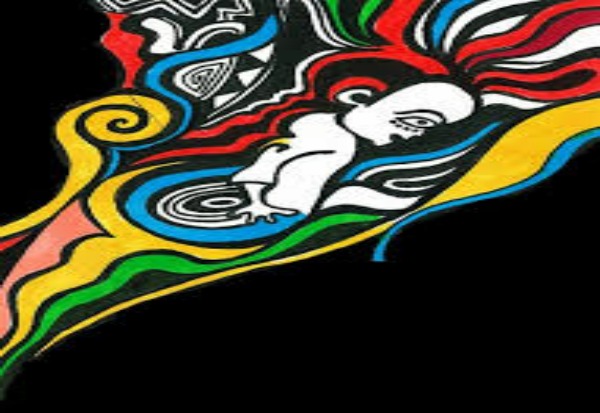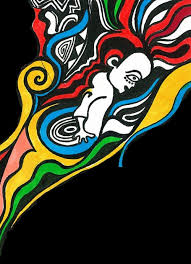Confessione dell’abiku che si era rifiutato di sbarcare a Lampedusa/ Confession of the abiku who refused to land in Lampedusa
No, non furono le spregevoli Leggi dell’Uomo
Che affondarono la barca
Con la sua vela di coperta incendiata
Al termine di una novella “Traversata degli schiavi”
Di fuga e dolore
Non fu la paura scolpita negli occhi
Dei pescherecci astanti
Che non osavano fermarsi
Per non rischiare il Gran Giurì
Della Legge dei Fatti i Fatti Tuoi
Ed essere giudicati complici
Del reato di Tentata Sopravvivenza
Non fu il parapiglia provocato
dalla Deriva dei Continenti
dalle Placche Tettoniche africane
in via di collisione con quella briciola di Europa
Lampedusa
Che se ne stava lì con le sue prigioni e le sue spiagge
Aspettando qualunque cosa portasse la corrente
Sia che si trattasse di cadaveri che di turisti.
No, amici, non andate a cercare risposte nell’Economia, nelle Scienze Politiche,
nella Storia del Diritto Internazionale
il colpevole sono,io, un minuscolo abiku
uno spirito bambino
uno di quelli indecisi
in costante andirivieni tra il mondo dei vivi
e il mondo degli spiriti
“riluttanti a rassegnarci al mondo”
Il Capitano dell’Unità Subacquea Renato Sollustri
Con addosso l’alta divisa delle immersioni
Più spaventoso alla vista che un alieno
Inviato dallo Stato a recuperare i corpi
Sebbene europeo, mi vide, si rese subito conto di chi io fossi
E rimase senza parola per due giorni.
Dondolando ancora dal cordone ombelicale di mia madre
Non ero pronto a scambiare le dolci acque del ventre materno
Per la durezza dell’aria e il lavoro dei polmoni
E il logorio dei muscoli e il sale delle lacrime
Al massimo avrei scambiato il liquido amniotico
Per le amare acque del Mediterraneo
E al diavolo le speranze
E le illusioni e le ambizioni e le aspettative
E le paure e i rimproveri e le rivendicazioni degli altri.
Di noi abiku dicono i romanzieri africani:
“non amava(no) le fatiche dell’esistenza, i desideri irrealizzati,
le venerate ingiustizie del mondo, i labirinti dell’amore
[…* temeva(no) la crudeltà degli esseri umani,
i quali nascono ciechi e raramente imparano a vedere”1
e fu così che scelsi il mare e non la terra
l’acqua e non il fuoco
rifiutai quella roccia che si sporgeva dalle onde
e ora vivo in ogni goccia di pioggia
in ogni lacrima versata per la malvagità degli Umani
dei loro terribili atti, delle loro terribili omissioni.
Pina Piccolo, 10 ottobre 2013
Qualche giorno dopo gli annegamenti di massa di migranti/rifugiati a poche centinaia di metri da Lampedusa, il Capitano di polizia Renatto Sollustri, dell’Unità Subacquea che si era immerso per recuperare i corpi, trovò nella stiva del barcone capovolto il corpo di una ragazza che aveva appena partorito prima di annegare; il neonato era ancora attaccato alla mamma con il cordone ombelicale.
- Ben Okri, “La via della fame”, capitolo 1, incipit.
Confession of the Abiku Who Refused to Land in Lampedusa*
No, it wasn’t the despicable Laws of Men
That sank the boat
With its fiery blanket of a sail
Completing a Middle Passage
Of escape and sorrow
No, it wasn’t the fear sculpted in the eyes
Of fishing boats passing-by
That dared not stop
Lest they be brought in front of the Grand Jury
Of the Law of Mind Your Own Business
And be deemed an accessory
To the crime of Attempted Survival
Nor was the commotion caused by
Continental Drift
the Tectonic Plate of Africa
Colliding with that tiny crumb of Europe
Lampedusa
As it sat there with its jails and beaches
Waiting for whatever the currents brought
Be it corpse or be it tourist.
No, friends, don’t go looking into Economics, Political Science,
History and International Law,
I am the responsible party,I, just a tiny Abiku
A spirit child
One of the indecisive ones
Forever moving between the world of the living
And the spirit world
“unwilling to come to terms with life”.
Police Captain Renato Sollustri,
In its full scuba diving gear
Scarier to behold than an alien
Sent by the State to recover the bodies
Though European, saw and knew who I was
and has now been speechless for two days.
Still dangling from my mother’s umbilical cord
I wasn’t going to trade the sweet water of the womb
For the harsh air and the work of lungs
And the work of muscles and the salt of tears
At the most I would trade amniotic fluid
For the bitter water of the Mediterranean sea
And to hell with the hopes
And illusions and ambitions and demands
And fears and reproaches and claims of the others
African novelists have described us abiku as
“dislike(ing) the rigours of existence, the unfulfilled longings,
The enshrined injustices of the world, the labyrinths of love..
..fear(ing) the heartlessness of human beings,
all of whom are born blind,
few of whom ever learn to see”1
and so I chose sea over land
water over fire
refused that encrusted rock jutting from the waves
and now live in every drop of rain
in every tear shed over the malice of Humans
and their terrible deeds and omissions.
October 10, 2013
*A few days after the mass drowning of migrants/refugees close to the shores of Lampedusa, Police Captain Renato Sollustri of the scuba diving police unit, who dove to retrieve the bodies, found under the capsized boat the body of a girl who had given birth just before drowning, the umbilical cord and the baby still attached to her body.
1Ben Okri “The Famished Road”, chapter 1.

